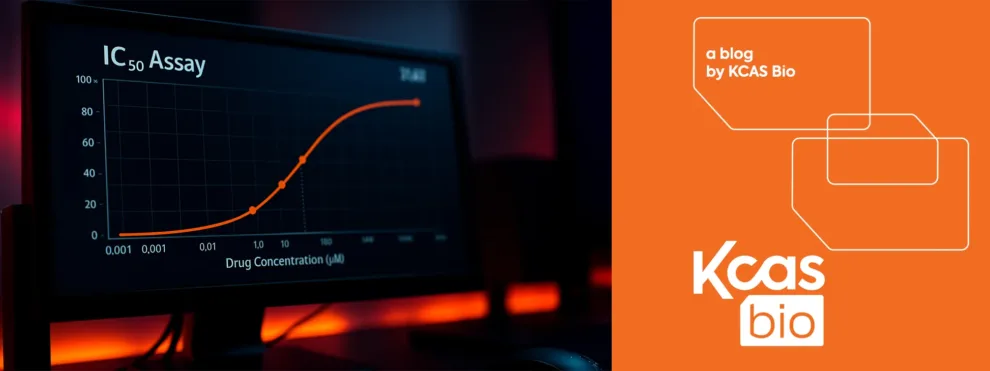In the process of drug discovery, an IC₅₀ assay serves as a pivotal component in the development of cutting-edge therapeutics. An effective assay can quantify the potency of compounds, enable side-by-side comparisons with competing compounds, and track how a compound performs over time. Quantifying compound inhibition also assists with pre-clinical decisions, informing how to advance a drug through its development pipeline.
When approaching IC₅₀ assay development, there is more to consider than simply generating the concentration of a compound at 50% inhibition of biological activity. It is paramount that the assay provides a reliable, biologically meaningful, and reproducible assessment. At KCAS Bio, we are dedicated to producing high-quality data through the development of reliable assays that can be accurately reproduced.
The Foundation of Quality: Experimental Design and Optimization
The journey toward producing a clean dose-response curve relies on three critical elements: experimental design, optimization, and data interpretation. However, several potential challenges can arise during the development process that must be carefully addressed.
Key Challenges in IC₅₀ Assay Development
1. Biological Variability
Compound testing can be performed on multiple biological materials, including cell lines, PBMCs, and whole blood. It is crucial to consider how the cells relate to the compounds being tested and what biological inhibition is being measured. Once the cell matrix is selected, the sourcing of samples should remain consistent throughout compound testing.
Changes in sample handling—such as using different anti-coagulants or varying the timing of assay initiation post-draw for fresh whole blood samples—can cause unexpected variation in results. Utilizing multiple donors with a constant test compound as a control helps account for donor variation in the compound’s potency inhibition. Maintaining consistent sample quality ensures that the IC₅₀ values generated are accurate and reliable.
2. Automation Variability
An assay can only function as well as the tools and instruments utilized to carry out the processing. In functional assays such as IC₅₀ assays, small errors in the mechanical function of pipettes and other automated systems become highlighted through unexpected data variation. Maintaining instrument function through daily maintenance and calibration is imperative.
Generating data with a flow cytometer can significantly enhance data quality and reliability. Cytometers such as the Cytek Aurora are highly sensitive to changes in fluorescence and allow compound inhibition to be detected even at low levels. Due to the high complexity of flow cytometers, quantitation bead controls can be used to mitigate and detect day-to-day fluorescence variation. The bead values generated can then normalize sample data and contextualize compound variation.
3. Compound Stability
Variations in compound preparation and storage can significantly affect potency. Standardizing processes—including limiting freeze-thaw cycles and using consistent storage locations—confirms that all compounds are treated equally. This ensures that any variation between compounds can be attributed to their true potency rather than handling differences.
4. Analyst Variability
The true test of an assay’s reproducibility lies in analyst-to-analyst variation. Consistent training and processing are key to ensuring that highly sensitive functional assays produce consistent results. Even small differences in technique, timing, or interpretation can lead to significant inconsistencies.
Implementing a standardized and specific process with consistent controls helps avoid variation that could naturally occur between analysts. Maintaining collaboration and cross-functional training ensures the most effective process is implemented and sustained throughout the duration of compound testing.
The Bottom Line: Quality Through Control
Reproducibility in compound screening ultimately comes down to controlling both biological and technical variables. These factors don’t just affect the raw IC₅₀ value—they determine whether your data is trustworthy, comparable, and publishable.
KCAS Bio recognizes the value in investing in high-quality materials and processing methods that guarantee quality data to our clients, even in the most sensitive assays. Through meticulous attention to these critical factors, we ensure that every IC₅₀ assay delivers the reliable, reproducible results essential for successful drug discovery.
Ready to ensure your IC₅₀ assays deliver consistent, high-quality results? Contact KCAS Bio to learn how our expertise in assay development can accelerate your drug discovery pipeline.

